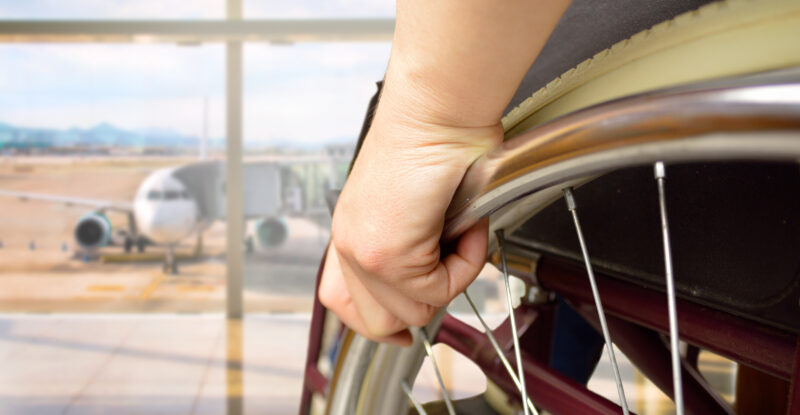 Today, the U.S. Department of Transportation (USDOT) announced that United Airlines will implement industry-leading actions that go above and beyond Federal requirements to improve the air travel experience for passengers who use wheelchairs.
Today, the U.S. Department of Transportation (USDOT) announced that United Airlines will implement industry-leading actions that go above and beyond Federal requirements to improve the air travel experience for passengers who use wheelchairs.
This action is part of an agreement with USDOT that follows a lengthy investigation by the Department into a disability complaint filed against United by Engracia Figueroa.
Disability complaints received by the Department against airlines, such as the one by Ms. Figueroa, highlight the significant challenges that people who use wheelchairs face during air travel to, from, and within the United States.
USDOT has made it a priority to improve the air travel experience for those who use wheelchairs.
“Everyone ought to be able to travel safely and with dignity, and I’m glad that United is taking steps to improve their service for passengers who use wheelchairs,” said U.S. Transportation Secretary Pete Buttigieg.
“For our part, we at USDOT will continue working to make air travel safer and more accessible for people with disabilities, and for the millions of Americans who step on a plane every day.”
Today’s announcement specifies that United will take the following actions:
- Roll out a flight filter on its booking engine to make it easier for passengers who use wheelchairs to find flights where their wheelchairs can fit and be safely transported.
- Refund the fare difference for passengers with wheelchairs that use the flight filter when the passenger’s preferred flight cannot accommodate their wheelchair and the flight that they travel on with their wheelchair is more expensive.
- Conduct a pilot program to explore whether additional equipment, such as a medical wheelchair or other form of moveable or non-moveable chair, can be utilized to safely accommodate passengers waiting for loaner wheelchairs because of damage or delay to their personal wheelchairs during a flight.
- Provide persons whose wheelchairs were damaged or delayed accommodation options, including United ensuring the timely delivery of the loaner wheelchair to the passenger, as part of the pilot program.
- Leverage the expertise of its Accessible Travel Advisory Board, which includes representatives of the Christopher and Dana Reeve Foundation and United Spinal Association, to determine how to implement the accommodation options in the pilot program. This will include what type of specialized seating equipment should be tested, how and where it will be utilized within the airport, and how best to collect user feedback.
- Seek feedback from each passenger who checks a wheelchair for transport in the aircraft cargo compartment. United will take the feedback into consideration when developing and enhancing its practices and procedures for handling wheelchairs.
The Department believes that these actions will better ensure passengers with disabilities who use wheelchairs can travel safely and with dignity. The Department will review United’s performance under this agreement and will act if any portion of the agreement has been violated.
Today’s announcement builds on the Biden-Harris Administration’s major investments in making infrastructure more accessible, such as:
- DOT has awarded billions of dollars through President Biden’s Bipartisan Infrastructure Law to modernize airport terminals, including adding wheelchair ramps, accessible restrooms, and more.
- In July, DOT finalized a rule which requires airlines to make lavatories on new single-aisle aircraft more accessible. The lack of accessible lavatories on single aisle aircraft has meant individuals with limited mobility often avoid flying or dehydrate themselves to avoid having to relieve themselves during flight. Under this final rule, airlines are required to take various steps to improve the accessibility of these lavatories short of increasing their size in the short term. In addition, in the long term, airlines are required to provide an accessible lavatory that is large enough to permit a passenger with a disability and attendant, both equivalent in size to a 95th percentile male, to approach, enter, and maneuver within as necessary to use the aircraft lavatory.
- Last December, DOT awarded nearly $700 million through its All Stations Accessibility Program to retrofit old rail and subway stations, adding elevators, ramps, and other improvements. The program, funded through the infrastructure law, is designed to improve the accessibility of transit rail stations so everyone, including people who use wheelchairs, push strollers, or cannot easily navigate stairs, can reliably access the rail systems in their communities.
- DOT has begun laying the preliminary groundwork for a potential future rule that would address passengers staying in their own wheelchairs when they fly.
- DOT is currently working on rules that would require better training for airline staff who physically assist passengers with disabilities or handle battery-powered wheelchairs or scooters.
- DOT is working with industry, academia, and Federal partners to ensure that the vehicles of the future – including automated vehicles, electric vehicles, and associated charging infrastructure – are designed inclusively.
The agreement with United can be found at: https://www.transportation.
For information about airline passenger rights, as well as DOT’s rules, guidance and orders, the Department’s aviation consumer website can be found at https://www.transportation.
Featured image credited to istock.com/Cunaplus_M.Faba









